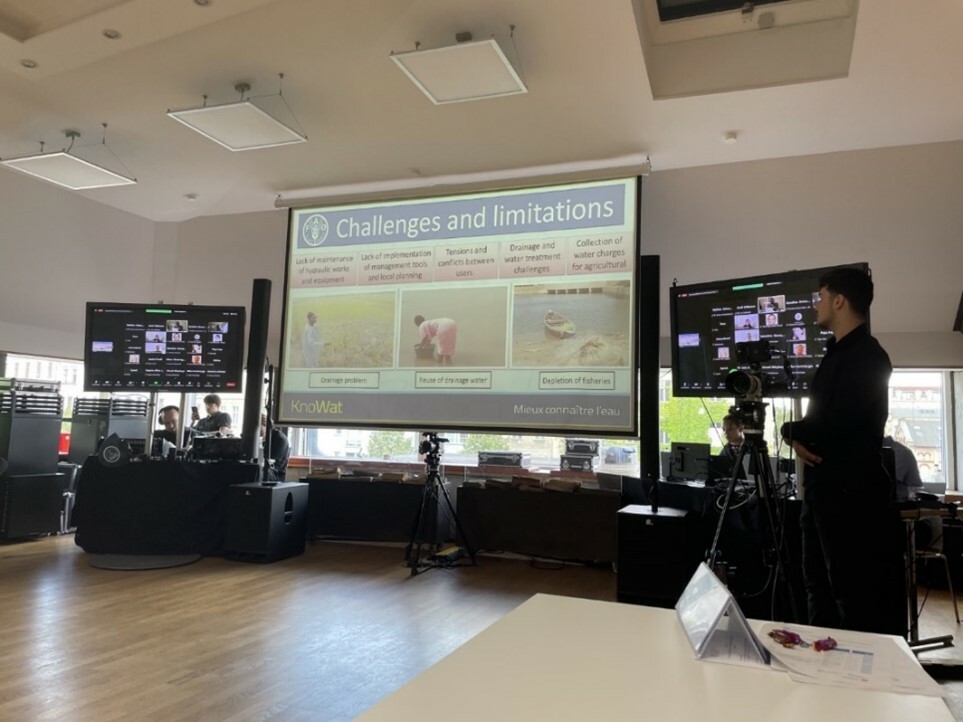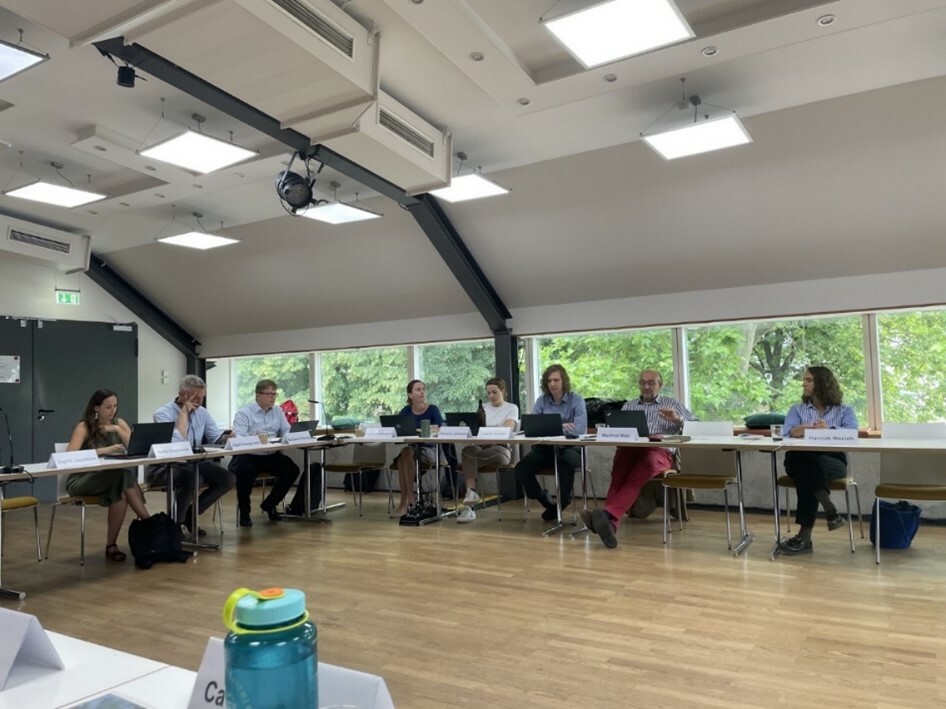Review // FAO Workshop on: Promoting Water Tenure for Food Security, Climate Resilience and Equity
The FAO-led workshop “Promoting Water Tenure for Food Security, Climate Resilience, and Equity” was implemented in coordination with adelphi on June 28th and 29th in Berlin, Germany. The objectives of the hybrid workshop were to learn the concepts of water tenure, exchange case studies and experiences, and chart the next steps for the water tenure concept. During the three topical sections of the event, participants were able to discover the notion of water tenure through keynote speeches, case studies and discussions between the onsite and online participants

© FAO website
Context and Introduction of the Workshop
Water tenure – the legal or customary relationship between people and water resources – is a bottom-up approach that plays a key role in water governance and the practices and processes around water management and allocation. It is a key component in reaching many of the Sustainable Development Goals as it is vital to ensure sustainable livelihoods, good governance, environmental protection, and sustainable economic development and, as such, (FAO, 2020). It offers a nuanced framework for recognizing the diverse kinds of formal water tenure relationships as well as those derived from customary and local practices. Another key benefit of thinking in terms of water tenure is that it focuses on the relationship between water users and the way in which it is accessed and used.
The workshop was realised by FAO and adelphi with the support of The Federal Ministry of Food and Agriculture (BMEL), The German Institute of Development and Sustainability
(IDOS), and The German Corporation for International Cooperation (GIZ) on behalf of the Federal Ministry for Economic Cooperation and Development (BMZ). It was structured to highlight three focus areas of work within the water tenure concept. 40 participants working on issues of climate resilience, social inclusion, and food security presented case studies and led discussions to facilitate a deeper understanding on the key challenges and potentials for solutions in these topic areas. These discussions culminated in working groups on the second day that, led by technical moderators, aimed to answer the question of how different actors could address the challenges raised and what opportunities a water tenure perspective could bring to addressing these challenges. This was followed by a panel discussion of practitioners on how to carry the water tenure concept forward within both the civil society sector and governmental institutions.

(Political) relevance of water tenure
The introductory remarks of the speakers highlighted the priorities and the focus of the workshop. Both Dr. Wolfgang Zornbach of the BMEL and Matthias Toll of the BMZ stressed the importance of intersectoral work in addressing the challenges of water scarcity, climate resilience, and food security and how these issues are linked to peace, equity, and global security.
“Water tenure can be used as a tool to mitigate contentious impacts and conflicts derived from water allocation issues”. Matthias Toll (BMZ)
Dr. Ines Dombrowsky from the IDOS reiterated the need for water tenure in achieving food security and other global priorities as equitable shares among sectors will be vital in not only achieving SDG 6 but also 2,7,13, and 15. In his opening remarks, Jippe Hoogeveen of asserted that in striving for water for sustainable food and agriculture, water tenure strengthens water accounting and highlights the importance of accurately quantifying resources. Through this workshop, as well as planned future events, it is hoped that the conceptual framework of water tenure will be mainstreamed.
The FAO project, Knowing Water Better (KnoWat) is developing a national water governance and tenure assessment methodology in three focal countries: Rwanda, Senegal, and Sri Lanka. As part of its mandate, the project aims to contribute to the global discourse and advance the understanding of the concepts of water tenure in the development sector with the ultimate goal of increasing food security by safeguarding water rights. The conceptualization of the water tenure workshop stems from this goal and bilateral discussions with GIZ projects on the potential uses of the water tenure concept for development work.

Water Tenure and Climate Resilience – The WEF Nexus relevance
Measures to adapt to climate change, e.g.: increasing the number of reservoirs or increases in water abstraction for irrigation, will impact water use arrangements and smallholder farmers. In many rural places water tenure and the rights to water usage are informal and therefore insecure. For smallholder farmers reliant on irrigation, formal water tenure is necessary to secure and safeguard their livelihoods while ensuring a flexibility that allows for adaptation to changing climatic conditions.
The first case study presented by Dr. Mohamad Mova Al’Afghani focused on “Peatlands and Water Tenure in Indonesia” and impacts from water allocation priorities and customary water usage. The second case study presented by Julie Trottier focused on Palestine and “Sacrificing Traditional Water Tenure to Favor High-Value Export-Oriented Agriculture.” The discussion that followed highlighted the need for integration of water governance with water accounting and adaptive planning for smallholder farmers as well as identifying what it is, or is not, a legitimate claim. This is particularly important within the context of climate change as water allocation prioritization will have to be adaptive and scale water usage. Water tenure provides a framework for certainty around water rights and, as is the case in the Indonesian case study, can prioritize smallholder famers or other small volume users. The determinization of legitimacy and its integration in governance continues to be a question, as is the effect governmental climate adaptation strategies, including water storage, will have on water tenure rights.
Water Tenure and Social Inclusion - The WEF Nexus relevance
Explicit legal recognition of communities’ and women’s freshwater tenure rights is central to realization of water and food security, sustainable livelihoods, and multiple SDGs as well as global climate, ecosystem restoration, and biodiversity goals. As it works from a ground up approach, the water tenure concept allows for informal arrangements to gain security and explicitly incorporates water rights to people and groups that are often left out. At the intersection of the water, energy, and food sectors, it is vital to have secure rights to water access and that any customary practices are legally recognized to ensure long term sustainable access for vulnerable groups.
The intrinsic linkage between land and water tenure was explored in the first case study “Expansion of Large-Scale Irrigated Agriculture and Implications for Water Tenure of Pastoralists in the Awash River Basin, Ethiopia” presented by Dr. Waltina Scheumann and Dr. Srinivasa Srigiri from the IDOS. The second case study focused on similar considerations of marginality and equity through a GIZ project implemented and presented by NIRAS- “Addressing Water Tenure through Simplified Management Plans and Local Conventions in Boeny in Madagascar.” The exchange following the case studies centred on the interlinkages of land tenure and water tenure and in particular how water tenure rights are envisioned within land-use planning and how water tenure will play a role in publicly held lands and lands that have multiple uses such as irrigation and life stock. The impact of more efficient water systems, including irrigation, came up and the point was reiterated that water tenure needs to be at the forefront of policy reforms because efficient technologies are redundant if smallholders do not have the rights to water.
Water Tenure and Food Security - The WEF Nexus relevance
Measures to adapt to climate change such as increases in the number of reservoirs or increases in water abstraction for irrigation will impact water use arrangements and smallholder farmers. In many rural places water tenure and the rights to water usage are informal and therefore insecure. For smallholder farmers reliant on irrigation, formal water tenure is necessary to secure and safeguard their livelihoods while ensuring a flexibility that allows for adaptation to changing climatic conditions.
In the first case study presented by Manfred Matz of GIZ, the interrelation of Water Tenure and Food Security in Tunisia was outlined with particular focus on how water tenure for food security must consider green water. In the following case study, Lamine Samake of the FAO described the KnoWat project’s work identifying the missing link between levels of water management currently employed in the Senegal River Delta. The following discussion centred on how both the concepts of green water and traditional customary practices can be integrated into formal systems to ensure food security and what that would look like for water governance at a national level.
“Water tenure assessments are vital in determining water policies as otherwise the codification of water tenure rights will be contrary to systems currently in place and leave stakeholders without a legal basis for the water they use”. Mr Samake (FAO)
Water Tenure and International Development
The common thread throughout the presentations and discussions were the power dynamics in play between water uses and the gap between water governance at the national level and water management at the local level. These themes can guide the work of water tenure within international development and global agenda-setting. Closing the first day, Jippe Hoogeveen from the FAO outlined the initiative for a global dialogue on water tenure. He stressed the point that governance on the global scale needs to include water tenure and the objective to include water tenure in the voluntary guidelines. Local assessments and country dialogues could integrate water tenure at the national level where the benefits will be felt the most, while regional consultations with international partners at a sub-continent level will drive the dialogue forward. The Water Tenure concept and the KnoWat assessment method will be presented over the next several months with the objective of having water tenure integrated into the Voluntary Guidelines on the Responsible Governance of Tenure of Land, Fisheries and Forests (VGGT) and mainstreamed for future projects.
Recommendations for entry points
The working groups and panel discussion on the second day reiterated many of the key points and lessons learned from the first day. The issue of power imbalances was a reoccurring theme with every group highlighting the need for a participatory approach to ensure equitable allocation and many groups mentioning working within existing systems such as basin authorities or watershed groups to strengthen outreach. The benefits of this type of cooperation were also highlighted in the panel discussion as working with stakeholders helps to document existing solutions to water challenges within the localities and has the potential to inform legal reform.
Recording
For more information, watch the full recording of the session available here!
Related Resources
- Publication // Land, Climate, Energy, Agriculture and Development in the Sahel
- Nexus Blog // Water-Migration Nexus and the Human Displacement Discourse
- Publication //The Groundwater‒Energy‒Food Nexus in Iran’s Agricultural Sector: Implications for Water Security
Relevant Literature
FAO. 2020. Unpacking water tenure for improved food security and sustainable development. Land and Water Discussion Papers. Rome. https://doi.org/10.4060/cb1230...
FAO. 2021. The state of the world’s land and water resources for food and agriculture – Systems at breaking point. Synthesis report 2021. Rome. https://doi.org/10.4060/cb7654en
FAO. 2022. Knowing Water Better- Water Tenure and Climate Resilience. Background Paper. 2022. Berlin.
FAO. 2022. Knowing Water Better- Water Tenure and Food Security. Background Paper. 2022. Berlin.
FAO. 2022. Knowing Water Better- Water Tenure and Social Inclusion. Background Paper. 2022. Berlin.
Hodgson, S. 2016. Exploring the concept of water tenure. Food and Agriculture Organization (FAO), Rome.
Troell, J. and Keene, S. 2022 (forthcoming). Legal Recognition of Customary Water Tenure in Sub-Saharan Africa: Unpacking the Land-Water Nexus. International Water Management Institute (IWMI) Research Report: Colombo, Sri Lanka.
